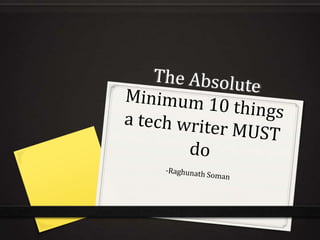
The absolute minimum 10 things for technical writers
- 2. Learn the tools 0 If your project requires a specific help authoring tool, learn it thoroughly - either on your own or with help of a mentor 0 Learn a good graphic tool (SnagIt and/or Visio) 0 Learn how to use version control and CMS. 0 Learn how to create a good-quality index 0 Learn shortcuts for frequently used functions 0 Last, but not the least: Learn to type… without looking at keyboard!
- 3. Learn the technology 0 Contrary to what you may think, you MUST learn the jargon! This helps immensely in talking with the SMEs in their own language. 0 If you are working on a long-duration project (> 6 months), try to find out as much as you can about HOWs and WHYs of the product.
- 4. Get access 0 Get access to: 0 The location where daily release builds are shared 0 The project e-mail alias 0 The bug tracker 0 The version control system (VSS/SVN..) 0 Access to these becomes increasingly critical as the release approaches 0 In turn, provide quick and easy access to your documentation
- 5. Use the product 0 Learn how to install and configure the product on your own. 0 Use the product… not just superficially, but really hack it. 0 If you find any issues, log a bug into bug tracker or share it with a QA. 0 Suggest improvements in UI, error messages, usability.
- 6. Read the Damn Manual 0 No, not the user manual… That’s something YOU are going to create, right? 0 Read all the available documentation, especially the High Level Design and Functional Requirements Specs 0 If you find something in the docs that’s NOT a part of the product, talk to a dev.
- 7. Use Checklists 0 Checklists are not something that you create at the end of the project, they should evolve with the project 0 Checklist should be atomic, that is broken down to the lowest level possible 0 No deliverable should be sent out unless it has passed though a comprehensive checklist
- 8. Befriend the QA 0 QA team is the usually best source of information regarding the product. 0 In exchange for their time for product KT, offer to share with them any bugs you may find
- 9. Build and Test 0 Insist on including the documentation from first build of product, in whatever state it is. 0 Do usability testing of your documents. If YOU can’t install a product by following your own installation guide, chances are, users won’t be able to, either! 0 Ask your friendly QA to review your document, and encourage them to raise bugs against you in the bug tracker.
- 10. Read 0 Your writing often reflects the depth of your reading; Read voraciously. 0 Harness the power of Web; read blogs, technical sites and user communities
- 11. Keep Writing 0 Keep writing… and not just technical writing. 0 Write a blog, contribute an article to your company newsletter, respond to queries in online forums. 0 Write some fiction; write a bit of poetry. 0 Writing is like driving; the more you practice, the better you become at it.
- 12. Thank You!
